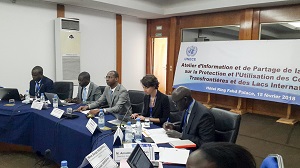
Senegal shares most of its water resources with other countries. The major part of its surface water reserves are located in the Senegal and Gambia River basins whose waters come from the Fouta Djallon Highlands in the Republic of Guinea. Cooperating on these shared waters is therefore essential to ensure economic development and preserve regional stability.
In this context, Senegal has confirmed its intention to accelerate its process of accession to the Convention on the Protection and Use of Transboundary Watercourses and International Lakes (Water Convention) which is serviced by UNECE. This represents the main outcome of the national workshop on the Convention held in Dakar on 15 February 2018.
The Water Convention provides a global legal and institutional framework for the sustainable management of transboundary water resources and for the promotion of cooperation.
The national workshop co-organized by the Ministry of Hydraulics and Sanitation and UNECE, aimed at detailing the obligations under the Convention, the benefits Senegal can obtain from its accession, the implementation and the possible challenges, as well as the next steps in the process. The workshop gathered approximately forty participants from different ministries, basin organizations and civil society.
Realizing the importance of water for the different development sectors of the country, Senegal placed transboundary water cooperation among its main priorities at an early stage. In the 1970s, Senegal already played a pioneering role in the creation of basin organizations on its two main transboundary basins, namely the Organization for the Development of the Senegal River Basin (OMVS) (1972), and the Organization for the Development of the Gambia River (OMVG) (1978). Created in the aftermath of the drought of the 1970s, the OMVS is today considered as a success story in terms of transboundary cooperation due to the important role it plays between its riparian countries for regional integration and for preserving stability and regional peace.
The Water Convention can play a significant role in ensuring a sustainable and peaceful management of shared water resources. Therefore, acceding to the Convention is also consistent with Senegal's efforts to draw the attention of the international community to the water-peace nexus, e.g. by bringing this subject to the United Nations Security Council in November 2016.
In this regard, the Secretary General of the Ministry of Hydraulics and Sanitation recalled the crucial current involvement of the country in several initiatives, such as its participation to the High-level Panel on Water and the High-level Panel on Water and Peace, as well as in the organization of the World Water Forum in Dakar in 2021. "In the light of these international water cooperation advances, it is timely to examine, exchange and progress towards accession to the 1992 Water Convention ".
Francesca Bernardini, Secretary to the Convention, stated, "Senegal has a lot to gain from its accession to the Water Convention but it also has a lot to contribute. We hope that the accession of Senegal will motivate other countries to join, in particular the member countries of the OMVS and the OMVG."
The Water Convention
The Water Convention has provided, since its entry into force in 1996, an important framework for improving transboundary water management for both surface and groundwater resources. It offers, under the auspices of the United Nations, a robust legal framework and a developed institutional platform allowing Parties to discuss transboundary water cooperation and to share knowledge and experience in many water management and protection-related areas. The Water Convention became a multilateral legal framework universally open for transboundary water cooperation, open to accession by all United Nations Member States since 1 March 2016.

